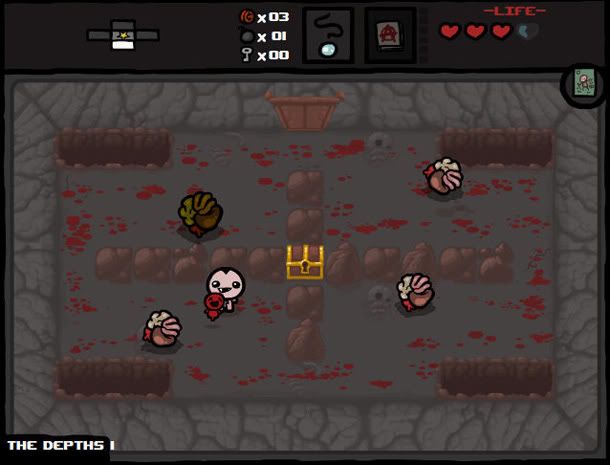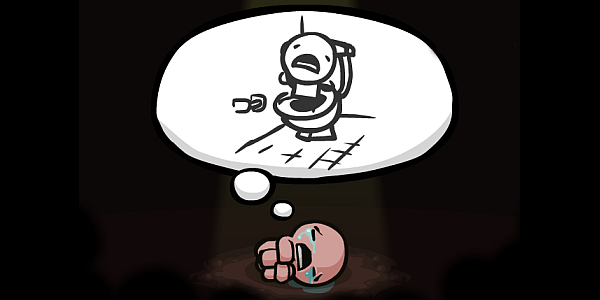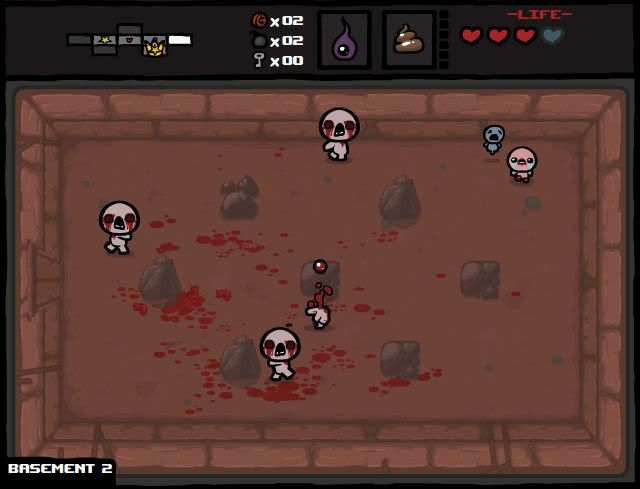This post has not been edited by the GamesBeat staff. Opinions by GamesBeat community writers do not necessarily reflect those of the staff.

No one embarrasses you like an overbearing mother can, and this is especially so when that parent basks in the seductive glow of the pathological delusions of the Moral Majority.
Poor Isaac, the son of an inattentive mom, sits unaware on the carpeted floor playing with his imagination while his detached guardian surrenders her mind to the ramblings of Jerry Falwell and Pat Robertson. In her catatonic state (and from hearing voices of Yahweh), she convinces herself to end little Isaac’s life in order to prove her devotion to a jealous god.
As he escapes through a hidden trap door in fear of his mother’s wrath, our protagonist hasn’t the slightest idea that he will relive repressed memories of his debasement through the horror-filled trials that await him.
This is where our journey begins. In the cold, dank filth of piss and shit, Edmund McMillen’s and Florian Himsl's The Binding of Isaac explores the depths of human depravity in cartoonish glee.

Crawling through the dungeons below, Isaac initially has only his tears to aid him. Abhorrent creatures of rotting flesh, blood-oozing wounds, and menacing glances lurk in every room, yet Isaac can redirect his sadness to extinguish their existence.
Publicly crying, especially for boys, is a humiliating experience for the American child; a macho culture subtly — even sometimes overtly — discourages such expressions of "weakness." That this emotion is Isaac’s sole weapon against the evil that prowls the darkness is revealing of what lies ahead.
Between the sprawling, randomly generated, Zelda-esque basements, caves, and depths, Isaac lays down to weep over his predicament. I imagine that he asks himself, "How did I get here? How did my life come to this? Why is this happening to me?" as memories of his humiliation force themselves into his mind…vignettes that offer a glimpse into the past abuse our poor Isaac has had to endure.
We’ll see Isaac recall a moment where he tries to give a pretty girl a sweet-smelling flower. Some prankster, perhaps a romantic rival, drops Isaac’s pants to reveal his naughty bits to the young lady. And she laughs. Mightily.

We’ll see Isaac receive a gift from someone (probably his mother) — maybe for his birthday or Christmas or some other special occasion — and watch as his initial delight of wearing a woman's wig degenerates into tears when a neighborhood kid laughs at Isaac's expense. Did his mom expect this? Does she wish he was a girl? Does he? Is that wrong?
He’ll receive other presents like a foul box of shit. In fact, poop features quite frequently in his debasement. In another memory, Isaac goes to the bathroom and realizes that the last person to squat there left an empty toilet-paper roll. (Probably his mother again. Does she expect him to wipe with his hands!?) And in yet one more, two bullies drop their drawers and blast their excrement all over our broken protagonist.
The religious themes of a superstition that revels in its own brand of humiliation color the game at every corner. Isaac must face his "sins" in the form of the Cardinal Vices thus named for the irredeemable mark they bestow onto their violators. But Isaac can make a pact with Lucifer for power in exchange for a slice of his humanity.
These are the phobias of an extremist interpretation of an ancient text — a revulsion that teaches its followers to be ashamed of their bodies, to sacrifice their desires and forgo pleasurable acts in the name of an unseen deity, and to fear that which is different and unfamiliar.

McMillen and Himsl have successfully married these themes of humiliation to the game’s design, which draws heavily from roguelikes (permadeath, unknown item properties, and randomization) and top-down twitch shooters like Smash T.V. These are genres that quickly put reckless players and blowhards to shame.
Rogue and its descendants trick players with devious traps and hidden dangers, which results in a uniquely tense experience. Players must risk all they have to proceed, and the foolhardy will meet with early demise. But all the while in The Binding of Isaac, the bullet-hell nature of combat requires precise, purposeful movement and retaliation to survive. The juxtaposition of the deadly unpredictable and the requirement of machine-like precision creates something quite unique and sublime.
And this is ultimately why The Binding of Isaac comes together so well. The narrative and aesthetic themes underscore the same kind of humiliation drawn from the mechanics of roguelikes and shooters. As a result, these parallels shape an experience that's both memorable and affecting.
